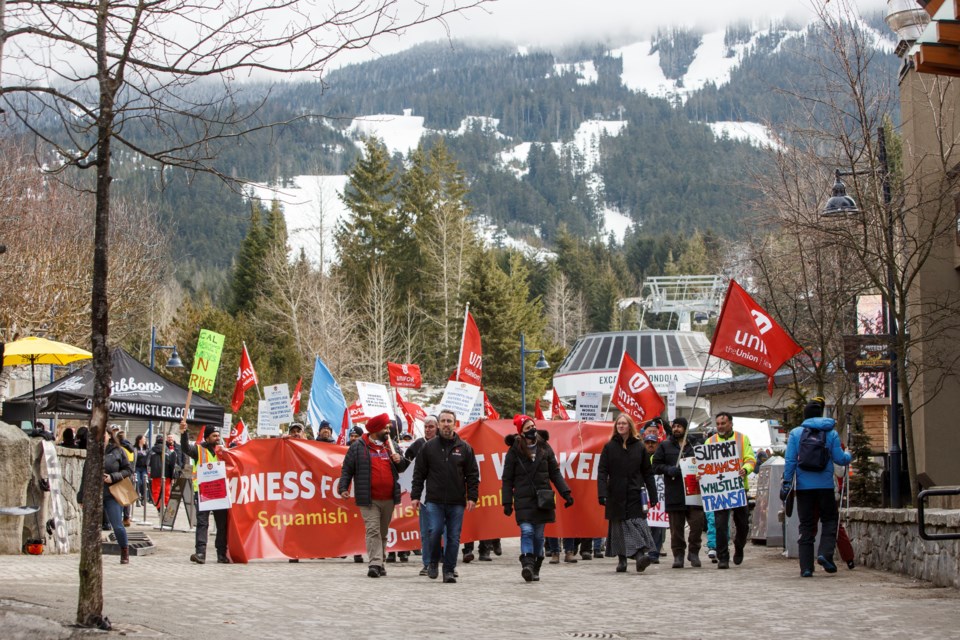While Victoria has appointed one of the most successful mediators to help with bargaining between Sea to Sky transit workers and their employer, the corridor's BC Liberal MLA is calling for more decisive action from the NDP government.
“Yesterday’s appointment of mediator Vince Ready is a good step, but one that should have been taken weeks ago. It’s time for the NDP to legislate binding arbitration as a backup plan should the non-binding mediation process fail to end this months-long strike,” said Jordan Sturdy in a news release.
In a follow up call with The Squamish Chief, Sturdy said there is no backup plan to the government's latest move. It is simply swapping out mediators, he said.
“If the NDP does not act and the mediation fails, there is no recourse apart from calling back the Legislature this summer or waiting until the fall session, which is far too long for the people in my community.”
Sturdy said the strike had forced people to rely on taxis or even hitchhiking, which is a serious safety concern.
“The NDP has failed by letting this drag on for so many weeks, and time is running out,” added Sturdy. “We need action to end this strike and we have a very limited time frame for the government to step up and introduce legislation for binding arbitration. This strike has gone on far too long — enough is enough.”
In the meantime, the Sea to Sky transit strike has become the longest transit strike in B.C. history.
Ready was appointed only a day after Unifor Local 114 members turned down the latest offer proposed by employer and BC Transit contractor Pacific Western Transportation (PWT) in a narrow 36-32 vote.
Now, the parties will have 10 days to come to a mediated settlement.
If a deal cannot be reached in that time, Ready will offer his non-binding recommendations that Unifor has already agreed to put to a vote to its members.
“After two years of bargaining and failed sessions with a mediator, it’s clear a more structured process is necessary,” said Gavin McGarrigle, Unifor Western regional director, in a release. “We look forward to making submissions to the mediator about the high cost of living and wage disparities.”
Last Friday, the union representatives and employer were at the bargaining table with mediator Dave Schaub, and while progress had been made on extending benefits and the union’s preferred pension plan to all local transit operators, achieving wage parity with Coast Mountain Bus Company workers in Vancouver has long been the major hurdle to cross.
In a statement Tuesday, May 31, PWT said its offer that was recommended by Unifor’s bargaining committee included an increase in wages compared to its May 11 offer, with annual wage hikes of 1.5% 2%, 3%, 3%, and 4% over the five-year term of the deal, resulting in a driver wage rate of $36.46 an hour. (Vancouver drivers make an average $36.71 per hour, the union has said.)
That’s in addition to a 2% signing bonus as well as employer-paid benefits for all employees and an agreement to transition to the union’s preferred defined benefit pension plan, points that had been previously agreed upon in negotiations.
“We believe this was a fair final offer and trusted that the committee’s recommendation to accept would yield a positive result in voting and allow a re-start of operations in the near future,” PWT continued.
However, Unifor members rejected the agreement as PWT “failed to make enough progress on wage parity,” Unifor said in a release Monday.
“Members have the final say in adopting the contract that governs their working conditions,” said McGarrigle at the time. “Clearly the employer fell short in closing the gap that exists between transit workers doing the same job in Vancouver and the Sea to Sky region.”
The strike began on Jan. 29.
The previous longest transit strike in B.C. history lasted 123 days in Vancouver in 2001.



